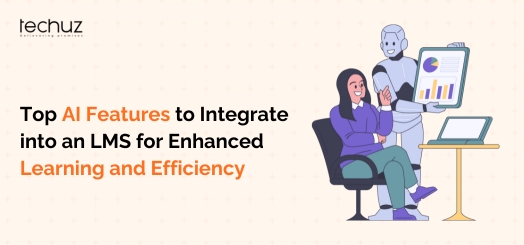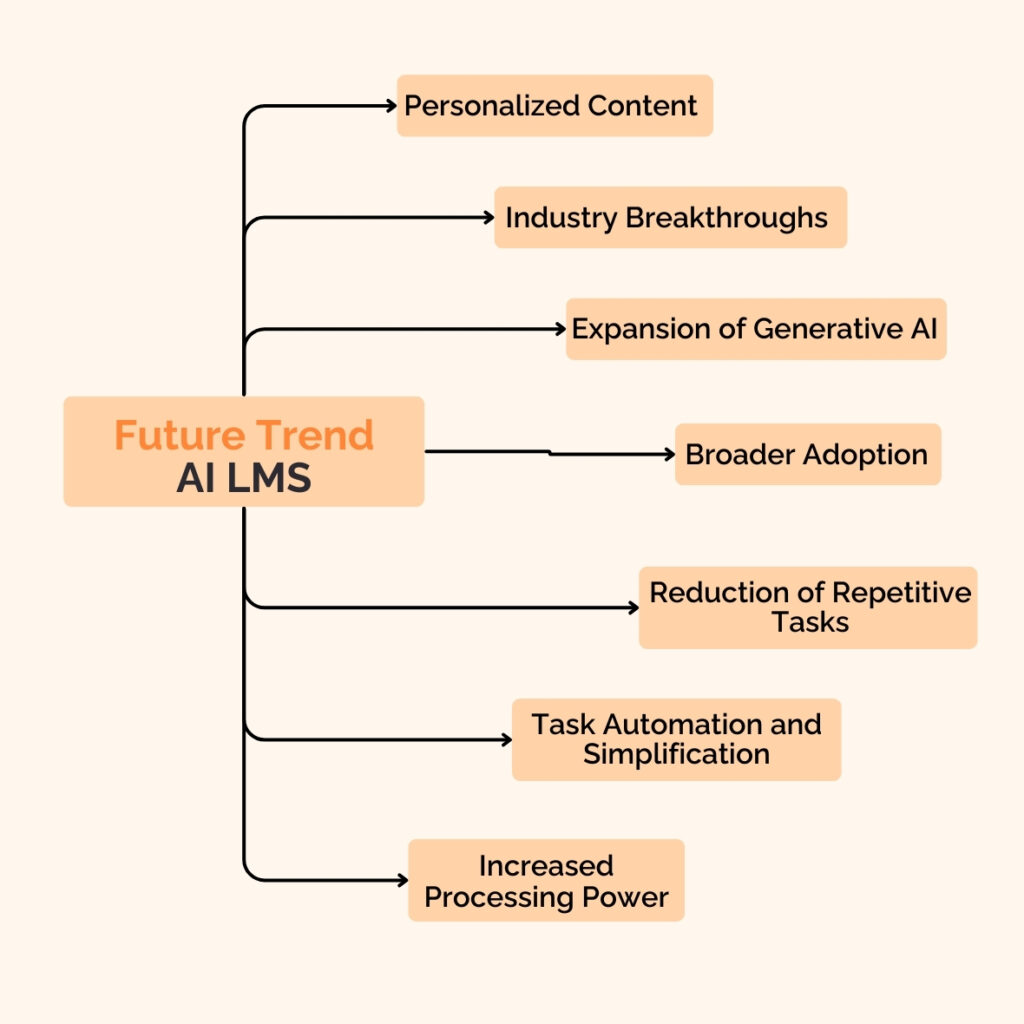Posted on
April 16, 2025
Read time
 4 mins read
4 mins read
AI is changing the Learning Management Systems (LMS) by introducing advanced capabilities that improve interactivity, personalization, and operational efficiency. Custom LMS development companies are now leveraging these AI-driven features to elevate the learning experience and optimize administrative processes. Here’s a professional overview of the most impactful AI features you should consider integrating.
Table of Content
Personalized Learning Paths
What It Does:
AI creates individualized learning experiences by analyzing user behavior, preferences, and performance metrics.
Key Benefits:
- Enhanced Engagement: Keeps learners motivated with tailored content that matches their interests and goals.
- Focused Learning: Eliminates irrelevant materials and highlights areas requiring improvement.
How It Works:
AI algorithms monitor learner progress and recommend courses, modules, and resources based on unique learning needs.
Intelligent Tutoring Systems
What It Does:
AI-powered virtual tutors offer real-time guidance, personalized feedback, and detailed explanations, mimicking a 1-on-1 mentoring experience.
Key Benefits:
- 24/7 Availability: Provides learners with round-the-clock support.
- Scalable Solutions: Can accommodate the needs of large learner groups without human limitations.
Examples:
- Virtual teaching assistants for corporate training.
- Real-time AI bots that help solve complex student queries.
Predictive Analytics
How It Helps:
AI analyzes learner data to identify patterns, predict trends, and detect at-risk learners early.
Key Benefits:
- Performance Insights: Provides a clear understanding of strengths and weaknesses.
- Proactive Interventions: Enables timely instructor support for struggling learners.
Use Cases:
- Monitoring course progress and completion rates.
- Predicting final grades and learner outcomes.
Automated Grading & Feedback
Why Use It:
AI streamlines the grading process for both objective and subjective assessments, ensuring quick, accurate, and unbiased evaluations.
Key Benefits:
- Time Savings: Reduces administrative tasks for instructors.
- Detailed Feedback: Offers learners actionable insights to improve performance.
Features:
- Automated grading for quizzes, assignments, and essays.
- Instant AI-generated feedback for written responses.
Natural Language Processing (NLP)
How It Enhances Communication:
NLP enables seamless interaction through chatbots, automated essay scoring, and AI-driven peer reviews.
Applications:
- AI-powered chatbots to handle FAQs and course-related inquiries.
- Automated evaluation of written assignments.
Key Benefits:
- Immediate Support: Provides instant answers and assistance to learners.
- Unbiased Evaluation: Ensures consistent grading standards for written content.
Advanced Search & Content Recommendations
What It Does:
AI enhances search functionality and suggests personalized learning materials to improve user experience.
Key Benefits:
- Efficient Navigation: Helps learners find specific topics or resources quickly.
- Increased Engagement: Encourages exploration of relevant and valuable content.
AI-Driven Video Content Analysis
How It Enhances Learning:
AI tools analyze video content to generate transcripts, subtitles, and summaries, making it more accessible and engaging.
Key Benefits:
- Inclusive Learning: Supports non-native speakers and learners with hearing impairments.
- Efficient Comprehension: Allows learners to grasp key ideas quickly.
Adaptive Assessments
What It Does:
AI adjusts the complexity of quizzes and exams in real time based on the learner’s performance.
Key Benefits:
- Accurate Skill Measurement: Tailors assessments to the learner’s knowledge level.
- Improved Engagement: Keeps learners appropriately challenged.
Applications:
- Personalized evaluations in K-12 and higher education.
- Skill assessments for corporate training.
Content Curation & Generation
How It Helps Instructors:
AI simplifies course creation by curating relevant resources and generating supplemental materials like quizzes and lesson plans.
Key Benefits:
- Efficient Content Management: Saves time on preparation.
- Up-to-Date Materials: Ensures courses feature the latest research and insights.
Proctoring & Security
Why It Matters:
AI-powered tools maintain the integrity of online exams by monitoring behaviors, verifying identities, and detecting anomalies.
Key Benefits:
- Enhanced Credibility: Ensures trust in online assessments.
- Fraud Prevention: Flags suspicious activities during exams.
Features:
- Fraud detection and identity verification.
- Behavior analysis for irregular patterns.
Conclusion
Integrating AI into an LMS is a strategic step toward enhancing learning experiences and administrative efficiency. Features like personalized learning paths, intelligent tutoring systems, predictive analytics, and AI-driven security make LMS platforms smarter, faster, and more reliable.
Whether you’re building a new LMS or upgrading an existing one, these AI capabilities can position your platform as a leader in the competitive e-learning market.









